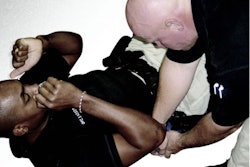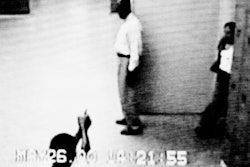“We only have two things going for us,” said Deputy Marshal Eddie Dolan, calling in from Kodiak. “No one’s been shot so far and no hostages are involved. All the rest is bad news.”
Silently, I had to agree.
“I’ll get back to you, Eddie,” I told him. “Meanwhile, find out as much as you can about this guy.”
Alaska’s Kodiak Island is rimmed with many small fishing villages along its coast. In one of them, Old Harbor, a mentally disturbed villager had panicked the entire town. Having just been released after a sanity hearing in Anchorage, Kenneth Burrell had returned to Old Harbor where he threatened his brother Robert, the schoolteacher, and Robert’s wife. He inflicted some bodily harm on their children and swore he would kill the wife, saying, “You’d be better off dead!”
She and the children fled by small plane to Kodiak, with Robert following. There, the U.S. Commissioner issued a warrant for Kenneth’s arrest. That’s where Eddie came into the picture. Details were what he needed.
Apparently, Kenneth had holed up in Kodiak’s only school, which overlooked the village. He was armed with the rifle Robert kept there and had a clear field of fire. Local pilots told Eddie that whenever a floatplane landed, Kenneth scrambled out of the school with his rifle and ducked back into the dense, wooded hillside behind the school. Trying to take him in either location would be hazardous. And probably bloody.
As chief of the U.S. Marshals in the Territory of Alaska I was responsible for finding the best solution for the situation. I chewed it over with Eddie.
“Let’s not try to take him on his own ground. What you need to do is find some way to suck him out of his pattern. What stirs him up outside of Robert’s family? Is there a girlfriend who can help? Who has he been in touch with lately? Get back to me if you come up with anything.”
He finally did. “It’s all over, Chief. No one’s hurt and he’s in the Kodiak jail.”
“How the hell did you manage it, Eddie?”
He laughed. “I found out he had a federal income tax problem. That’s the bait I used to reel him in.”
It was true. The IRS said Kenneth owed them money; Kenneth claimed he was entitled to a refund. Eddie persuaded the IRS official to contact Kenneth on the schoolhouse radio and tell him that his refund was waiting for him if he would come to Kodiak and sign for it. Kenneth agreed but demanded a plane be sent to pick him up. Eddie arranged it and when the plane returned from Old Harbor with one passenger, Eddie (with backup) arrested Kenneth.
About 30 years later, the Marshals Service used a similar scam to lure fugitive criminals out of hiding by advertising that the fugitives had won certain financial prizes, which were waiting to be claimed. I was happy to learn that the same technique we had used much earlier in Kodiak hadn’t lost its charm.
Jim Chenoweth and his wife moved to Alaska in 1951. There he began a law enforcement career as a criminal investigator. This account is from Down Darkness Wide, Chenoweth’s second book, an account of his law enforcement experiences in Alaska before it became a state. It has been published by Publish America.
Death and Taxes
“We only have two things going for us,” said Deputy Marshal Eddie Dolan, calling in from Kodiak. “No one’s been shot so far and no hostages are involved. All the rest is bad news.”
















